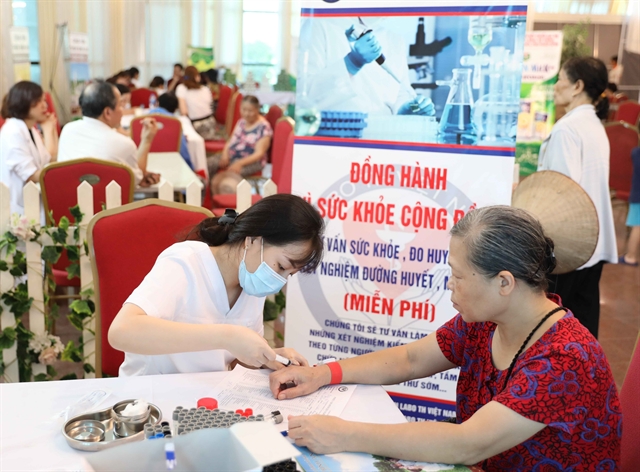 Society
Society


|
| Elderly people are given free blood tests during a healthcare campaign on Việt Nam Family Day (June 28. 2020) in Hà Nội. — VNA/VNS Photo Thanh Tùng |
HÀ NỘI — Nearly 12 per cent of Việt Nam’s population of 98.7 million are elderly, with 60 per cent living in poor health conditions, according to Nguyễn Hồng Quân, Chairman of the Việt Nam Association for Community Health Education (VACHE).
An elderly person in Việt Nam suffers from three to six diseases on average and more effort is needed to care for them, Quân told a forum in Hà Nội on Wednesday about care of the elderly’s health in the community.
The proportion of the elderly in Việt Nam's population is forecast to reach 17.9 per cent in 2025 and 23.5 per cent by the middle of the century, he added.
On October 13, Prime Minister Nguyễn Xuân Phúc issued Decision No 1579/QD-TTg approving a programme to provide healthcare services to the elderly to 2030, laying the foundation for stronger activities to care for their health.
Vice Chairman of the National Assembly’s Committee for Social Affairs Bùi Sỹ Lợi told the forum that average life expectancy in Việt Nam is relatively high at 74.4, but living conditions can be quite difficult, depending on their offspring.
They bear the burden of illness and chronic disease as well as the risk of becoming disabled, requiring high treatment costs. Meanwhile, the quality of healthcare in general and the elderly's health in particular are yet to meet the needs of a rapidly-aging population, he said.
He underlined that the building of a friendly environment for the elderly as well as the implementation of long-term healthcare programmes in the community have yet to be given adequate attention, and the ratio of the elderly covered by health insurance remains modest.
Lợi said that in order to reach targets in healthcare programmes targeting elder people to 2030, it is necessary to enhance the Party and Government’s leadership and direction in the field, along with more communications to call for the engagement of families and the community as a whole in caring for the elderly.
Meanwhile, relevant agencies need to develop the initial healthcare system and improve the quality of efforts preventing the spread of non-communicable diseases and providing healthcare services for the elderly, gradually building a long-term care programme for them, he said.
Vice President of the Việt Nam Association of the Elderly, Nguyễn Hoà Bình, proposed the building of a network of nursing facilities for the elderly based on expanding nursing for in-need people, along with the piloting of a public-private partnership model on providing nursing services to the elderly. — VNS




